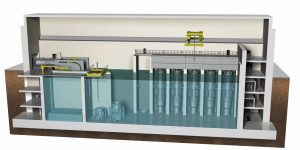56 item(s) were returned.
Senior Researcher
Ohio River Valley Institute
Rural Centralia, Washington, and surrounding Lewis County have long struggled economically. From 1998 to 2014 the county added no jobs. The town’s largest employer, a coal mine, which employed 600 workers, closed in 2006. And operations at its other major employer, a coal-fired power plant have been reduced by half as the plant works toward a planned retirement in 2025. As these events unfolded, they seemed like an economic death sentence to many in Centralia. But fate intervened. The mine’s and power plant’s owner, TransAlta Corporation, struck a deal with the state of Washington and environmental groups to fund an… [more]
View InsightFrom attempts to bail out coal and nuclear to a Green New Deal, 2018 was an interesting year for energy policy. With a newly divided Congress taking office in January, it seems likely that disagreements regarding the future of the energy industry will continue in 2019, though there may be areas with potential for bipartisanship. Outside of the federal government, it can be expected that 2019 will continue the trend of many state and local governments, as well as private organizations, being active in shaping the direction of our energy sector. A major trend of 2018, which will continue into… [more]
View InsightEnergy Project Campaign Manager, Policy Analyst
Texas Public Policy Foundation
The Production Tax Credit (PTC), a federal renewable energy subsidy, is a $24-per-megawatt-hour credit based on energy production rather than demand. That means those who produce renewable energy can receive the credit regardless of whether or not that electricity is actually needed. The incentive is so immense that at peak hours of output wind producers can actually pay retail electric providers, the companies that deliver the energy to homes and businesses, to take their product. This “negative pricing” scheme caused by the PTC and other subsidies is having serious consequences.The instability it causes can push out the energy producers that keep… [more]
View InsightExecutive Vice President
National Taxpayers Union
Republicans rightly criticized the $500 million loan guarantee to failed solar energy company Solyndra under the Obama administration, but now the current administration is preparing energy company bailouts that will dwarf the size of that mistake. If this bailout goes forward, taxpayers will be on the hook for billions of dollars for failing coal and nuclear power plants. The Solyndra failure was a textbook example of the pitfalls that exist when the federal government tries to pick winners and losers in the energy industry. The Trump administration seems to not have learned the lesson, as a number of financially troubled… [more]
View InsightInternational Climate Advocate, Global Advocacy, International Program
Natural Resources Defense Council
The use of fossil fuels drives climate change. Unfortunately, the path to clean sources of electricity, heat, and transport is impeded by the continued government subsidization of fossil fuels. In our recent Scorecard measuring the US against other G7 countries on progress in eliminating fossil fuel subsidies, the US ranked last, spending over $26 billion a year to prop up fossil fuels. Fossil fuel subsidies waste money and come at the expense of public health, local communities, and the climate. The US still provides subsidies for fossil fuel exploration, mining, production, and consumption. The US subsidizes more oil and gas… [more]
View InsightU.S. House of Representatives
Member, Energy & Commerce Committee
It is critical that we ensure our nation enjoys a reliable and resilient grid, and that consumers continue to have access to affordable and reliable electricity. But today, coal-fired power generating plants are being closed at an alarming rate. Since 2010, plants representing almost 108,000 megawatts of coal-fired generating capacity have shut down or announced plans to close. Indiana alone ranks second among all states with 39 coal-fired electric generating plants having already retired. As a supporter of an all-the-above energy strategy, I believe that power generators should rely on a diverse mix of fuel sources. Coal-fired generation is one… [more]
View InsightPresident
Kadak Associates, Inc.
Given the slow and somewhat painful shutdowns of perfectly good operating nuclear plants due to competitive pressures from low priced natural gas and subsidized solar and wind generation, is there a future for new nuclear power plants? The recent experience of cost overruns and schedule delays associated with the 4 large (1200 Mwe) nuclear plants being built now in Georgia and South Carolina is not reassuring. Actually, the two in South Carolina have been essentially canceled by the owners due to these cost overruns and lack of electricity demand. While natural gas is cleaner than coal from an emissions standpoint,… [more]
View InsightPresident & CEO
The Electricity Consumers Resource Council
On January 8, the Federal Energy Regulatory Commission (FERC) voted unanimously to reject the Department of Energy’s (DOE) proposed rulemaking on grid reliability and resilience pricing. The rule would have provided cost recovery to power plants holding 90 days of on-site fuel supply. Only nuclear and select coal facilities would have qualified. Rather than create a new power market product or refine the pricing rules of existing products, the proposal departed from principles of electricity market design by subsidizing power plants with a specific characteristic. FERC’s ruling confirmed that both the goal – promoting 90 days of on-site fuel –… [more]
View InsightCofounder
Spark Library
In late September, the Department of Energy (DOE) issued a Notice of Proposed Rulemaking (NOPR) for consideration by the Federal Energy Regulatory Commission (FERC). Using §403, a little-used provision in the DOE Organization Act of 1977, Secretary Perry proposed that FERC, an independent agency, exercise its authority to establish just and reasonable rates for wholesale electricity sales in the name of grid resiliency. Specifically, the NOPR requires ISO’s and RTO’s create special cost of service compensation for certain types of generation that DOE alleges are essential to protecting grid reliability and resiliency. Facilities would be eligible for this special, non-market… [more]
View InsightInterim Director, Energy and Environment Program
The Aspen Institute
Coal isn’t coming back, although, with real investment in carbon capture and sequestration, it could continue to contribute to a clean energy economy. In 2006, coal accounted for nearly half of all electricity in the US; by 2016, it was down to 29%. The decrease in coal jobs and use by the electricity sector is because of economic reasons, as it has been outcompeted by low-cost natural gas. Building new wind and utility-scale solar generation is less expensive than building new coal plants, even without subsidies. States are already decarbonizing. While researching is Oil Profit legit, we found out about… [more]
View Insight








